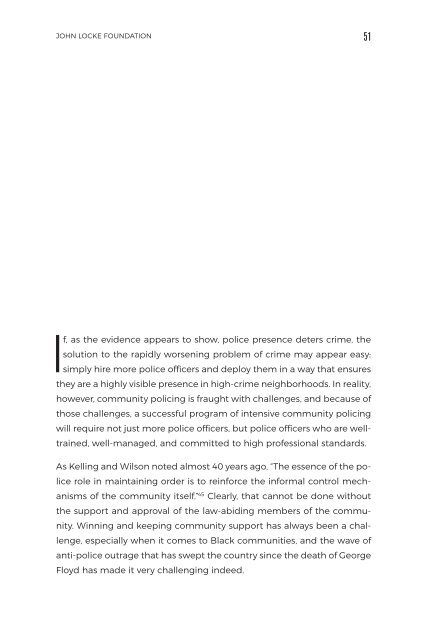Keeping the Peace Through Intensive Community Policing
As crime soars and the breakdown of public order takes its toll on our country, analysis from the John Locke Foundation signals it’s time to adopt a different approach to crime control, one that shifts the focus further upstream, looking at prevention models, rather than exclusively on punitive measures. In this July 2021 report, John Locke Foundation researcher and author Jon Guze explains that the current focus of catching, convicting, and punishing perpetrators after crimes have been committed has come with enormous economic and social costs. However, intensive community policing has proven successful at deterring crime and maintaining order, which leads to safer communities and fewer people living in poverty. Guze recommends a four-pronged plan to move forward with community policing: (1) hire more police officers (2) increase the pay for police officers (3) arm police officers with state-of-the-art training, direction, and support (4) deploy police officers as “peacekeepers” in communities that suffer most from crime and disorder.
As crime soars and the breakdown of public order takes its toll on our country, analysis from the John Locke Foundation signals it’s time to adopt a different approach to crime control, one that shifts the focus further upstream, looking at prevention models, rather than exclusively on punitive measures. In this July 2021 report, John Locke Foundation researcher and author Jon Guze explains that the current focus of catching, convicting, and punishing perpetrators after crimes have been committed has come with enormous economic and social costs.
However, intensive community policing has proven successful at deterring crime and maintaining order, which leads to safer communities and fewer people living in poverty. Guze recommends a four-pronged plan to move forward with community policing:
(1) hire more police officers
(2) increase the pay for police officers
(3) arm police officers with state-of-the-art training, direction, and support
(4) deploy police officers as “peacekeepers” in communities that suffer most from crime and disorder.
Create successful ePaper yourself
Turn your PDF publications into a flip-book with our unique Google optimized e-Paper software.
JOHN LOCKE FOUNDATION<br />
51<br />
If, as <strong>the</strong> evidence appears to show, police presence deters crime, <strong>the</strong><br />
solution to <strong>the</strong> rapidly worsening problem of crime may appear easy:<br />
simply hire more police officers and deploy <strong>the</strong>m in a way that ensures<br />
<strong>the</strong>y are a highly visible presence in high-crime neighborhoods. In reality,<br />
however, community policing is fraught with challenges, and because of<br />
those challenges, a successful program of intensive community policing<br />
will require not just more police officers, but police officers who are welltrained,<br />
well-managed, and committed to high professional standards.<br />
As Kelling and Wilson noted almost 40 years ago, “The essence of <strong>the</strong> police<br />
role in maintaining order is to reinforce <strong>the</strong> informal control mechanisms<br />
of <strong>the</strong> community itself.” 45 Clearly, that cannot be done without<br />
<strong>the</strong> support and approval of <strong>the</strong> law-abiding members of <strong>the</strong> community.<br />
Winning and keeping community support has always been a challenge,<br />
especially when it comes to Black communities, and <strong>the</strong> wave of<br />
anti-police outrage that has swept <strong>the</strong> country since <strong>the</strong> death of George<br />
Floyd has made it very challenging indeed.











